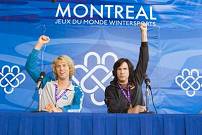|
|
||||
|
|
by Jeffrey Chen  Blades of Glory continues the Will Ferrell tradition of comedies banking on one very funny premise: hotshot men who lose their position of privilege must conquer their own simplistic male insecurities in order to rise back to the top. The movie makes it clear that Ferrell and his buddies are now happy to cruise on that golden platform. We might count Anchorman as the initial instance of this formula, where a macho news crew finds itself adjusting poorly to the arrival of a female anchor; and Talladega Nights as the second, where a redneck NASCAR king falls from grace, thanks to his being outdriven by a cultured gay French rival. Now we have a movie in which two male figure skaters who despise each other must join together to become a skating pair in order to return from -- you guessed it -- a fall from grace. In all cases, Ferrell's comedy cohorts have been able to smartly avoid ridiculing the objects that elicit the insecurities from within their protagonists by keeping the lampooning focused on those protagonists. If these men feel threatened by women and homosexuals, they only have their own relative immaturity to blame, and their actions make them look the fool. In Blades of Glory, there's plenty of lighthearted ribbing about the perceived "gay" nature of the sport, but it's never attacked; instead, the story's heroes must overcome such perceptions before achieving success. The message to the American male is simple and sweet: just grow up already. To that end, Blades of Glory is a spirited addition to this line of movies, but, alas, the formula is starting to wear around the edges. The movie is shadowed by a slight sense of deja vu because we've seen these situations and characterizations before. Well, in Ferrell's case anyway, he looks like he barely had to flex a comedic muscle with this performance. It's starting to become old hat. Relatively more refreshing is Jon Heder's turn as the reluctant partner, the counterpoint to Ferrell's goofy alpha male act. Heder's character doesn't worry about appearing "girly" mainly because he doesn't know any better, making him very interesting overall -- he's definitely a straight male (and to emphasize the point, he gets a love interest) but he doesn't spend any time worrying about whether or not others would suspect he isn't. Ferrell and Heder's scenes together come across lively enough, even though the movie is really funny only in spurts. Part of this may be due to the writing, which feels less spontaneously silly than the other films mentioned, and another part is due to that been-there-done-that feeling. Overall, it's pleasing enough but easily forgettable. Blades of Glory might have benefitted by further following through on its theme of men conquering male intimacy issues. The theme is mainly utilized to maximize the humor in the story's set-up, less so in the outcome. It plays things safe by equating such intimacy to brotherly love, which is acceptable but not particularly daring. That's not a suggestion to necessarily culminate in the glorious Talladega Nights kiss, but there's the sensation that this movie just didn't want to push it, which is a shame considering the potential in their subject of figure skating. In both comedy formula and thematic execution, Blades of Glory's reins were a little too tightly held. (Released by Paramount Pictures and rated "PG-13" for crude and sexual humor, language, a comic violent image and some drug references.) Review also posted at www.windowtothemovies.com. |
||
|
© 2026 - ReelTalk Movie Reviews Website designed by Dot Pitch Studios, LLC |



